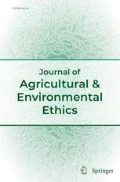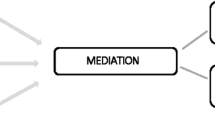Abstract
In this paper, I investigate the moral status of agricultural biotechnology and, more specifically, genetically modified (GM) crops by employing the hubris argument. The old notion of hubris, given to us by the ancient Greeks, provides a narrative from which we can understand ourselves and technology. Ronald Sandler offers us an understanding of hubris he claims gives us a prima facie reason and a presumption against the use of GM crops. I argue that Sandler’s hubris argument fails for several reasons: (1) Sander and many others fail to have a proper understanding of agriculture as an inherently technological practice which is radically different from ‘nature’; (2) the notions of control and manipulation which are central to the concept of hubris are difficult to understand and use in the context of agriculture; (3) trying to establish a prima facie reason against GM crops runs into serious difficulty since many GM crops are profoundly different from each other; and (4) even if we accept Sandler’s argument of hubris, it actually plays no role in the reasoning and evaluation of the moral status of different GM crops.
Similar content being viewed by others
References
Ali, A., & Abdulai, A. (2010). The adoption of genetically modified cotton and poverty reduction in Pakistan. Journal of Agricultural Economics, 61, 175–192.
Alteiri, M. (2000). Food First Special Report No. 1. Genetic engineering in agriculture: The Myths, environmental risks, and alternatives. Oakland, CA: Food First/Institute for Food and Development Policy.
Aristotle. (2002). Nicomachean ethics (S. Broadie & C. Rowe, Trans.). New York: Oxford University Press.
Comstock, G. (2000). Vexing nature? On the ethical case against agricultural biotechnology. Massachusetts: Kluwer Academic Publishers.
Crisp, R., & Slote, M. (Eds.). (1997). Virtue ethics. New York: Oxford University Press.
Driver, J. (2012). Consequentialism. New York: Routledge.
Enserink, M. (2008). Tough lessons from golden rice. Science, 320(5875), 468–471.
Gambrel, J. C., & Cafaro, P. (2010). The virtue of simplicity. Journal of Agricultural and Environmental Ethics, 23, 85–108.
Grinbaum, A. (2010). The nanotechnological golem. Nanoethics, 4, 191–198.
Hursthouse, R. (1999). On virtue ethics. Oxford: Oxford University Press.
Jamieson, D. (2007). When utilitarians should be virtue theorists. Utilitas, 19(2), 160–183.
Kahane, G. (2011). Mastery without mystery: Why there is no Promethean sin in enhancement. Journal of Applied Philosophy, 28(4), 355–368.
Katz, E. (2011). Preserving the distinction between nature and artifact. In E. G. Kaebnick (Ed.), The ideal of nature: Debates about biotechnology and the environment (pp. 71–83). Baltimore: The John Hopkins University Press.
McConell, K. D., & Dillon, L. J. (1997). Farm management for Asia: A systems approach. (FAO Farm Systems Management Series—13). Food and Agriculture Organization of the United Nations. Rome. http://www.fao.org/docrep/w7365e/w7365e04.htm.
McKibben, B. (1999). The end of nature (2nd ed.). New York: Anchor Books.
Mill, J. S. (1998). Three essays on religion. New York: Prometheus Books. (Original work “Nature” published in 1874).
Norlock, J. K. (2010). Forgivingness, pessimism, and environmental citizenship. Journal of Agricultural and Environmental Ethics, 23, 29–42.
Nussbaum, M. (1990). Aristotelian social democracy. In R. Bruce Douglass, Gerald M. Mara & Henry S. Richardson (Eds.), Liberalism and the good (pp. 203–252). New York & London: Routledge.
Nussbaum, M. (1993). Non-relative virtue: An Aristotelian approach. In M. Nussbaum & A. Sen (Eds.), The quality of life (pp. 242–269). Oxford: Oxford University Press.
Oakley, J., & Cocking, D. (2001). Virtue ethics and professional roles. Cambridge: Cambridge University Press.
Osborne, L. (2002). Got silk. New York Times. http://www.nytimes.com/2002/06/16/magazine/got-silk.html. Accessed April 23, 2014.
Papadimitropoulos, L. (2008). Xerxes' “hubris” and Darius in Aeschylus’ “Persae”. Mnemosyne, 61(3), 451–458.
Sandler, R. (2004). An aretaic objection to agricultural biotechnology. Journal of Agricultural and Environmental Ethics, 17, 301–317.
Sandler, R. (2007). Character and environment: A virtue oriented approach to environmental ethics. New York: Columbia University Press.
Scott, D. (2005). The magic bullet criticism of agricultural biotechnology. Journal of Agricultural and Environmental Ethics, 18, 259–267.
Stokstad, E. (2008). Papaya takes on ringspot virus and wins. Science, 320(5875), 472.
Swanton, C. (2003). Virtue ethics: A pluralistic view. Oxford: Oxford University Press.
Thompson, P. (2009). Philospohy of agricultural technology. In A. Meijers (Eds.), Handbook of the philosophy of science: Philosophy of technology and engineering sciences (Vol. 9, pp. 1257–1274). Oxford: Elsevier VB.
Weale, A. (2010). Ethical arguments relevant to the use of GM crops. New Biotechnology, 27(5), 582–587.
Acknowledgments
I would like to express my deepest gratitude to Per Sandin for being an excellent supervisor and for his valuable feedback on this paper. Thanks also to Sven Ove Hansson and Karin Edvardsson Björnberg for valuable comments. Thanks to William Bülow, Karim Jebari and all my colleagues at KTH for the contribution to this paper from our department seminar.
Author information
Authors and Affiliations
Corresponding author
Rights and permissions
About this article
Cite this article
Moula, P. GM Crops, the Hubris Argument and the Nature of Agriculture. J Agric Environ Ethics 28, 161–177 (2015). https://doi.org/10.1007/s10806-014-9526-7
Accepted:
Published:
Issue Date:
DOI: https://doi.org/10.1007/s10806-014-9526-7




